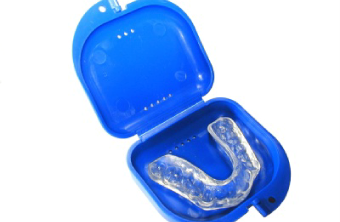Teeth Grinding & Headaches
23 Mar 2021Often sub-conscious, teeth grinding and clenching can ruin teeth and cause pain from your jaws to your temples. Grinding the teeth together is called ‘bruxing’ and squeezing the teeth together is called ‘clenching’. Since these acts are not part of the jaw’s normal function, they are called ‘para function’.
Para function normally takes place during sleep but may also occur during the day and may be unknown to the conscious mind.
Bruxism sufferersmay experience
- Headaches
- Tension in the temple region
- Neck pain and tension
- Pain behind the eyes
- Sore jaw muscles and tired muscles upon wakening
- Toothache
- Chipped or fractured teeth
Causes of para function
- Structural triggers – bite discrepancy between the most comfortable position of the jaw joint and the most comfortable way that the teeth come together.
- Psychological triggers – stress and nervous tension.
- Chemical triggers – Consuming caffeine and/or amphetamines can enhance the contractions of the jaw muscles and bring about severe clenching and grinding, as can withdrawal from drug dependencies such as nicotine.
- Habitual – after months or even years of grinding and clenching, the act becomes a habit, so to eliminate other factors will not completely stop habitual grinding and clenching without addressing the habit itself.
Perhaps the most immediate, least expensive and most effective way of stopping the damage and severity of grinding and clenching is through the creation of a repositioning splint.

A repositioning splint looks like a traditional night guard but has certain functions built into it. The device not only protects your teeth when you grind but, in addition, it reduces your urge to grind.
Teeth grinding can be a noticeable problem for many patients, especially if the teeth grinding takes place during the day. However, some patients may be teeth grinding in their sleep, which means they can be unaware of the problem. When a patient is unaware of their teeth grinding, the problem often continues until their teeth start to get damaged – caused by excessive and long-term teeth grinding – after which the condition is detected by a dentist. Therefore, it is essential not to wait too long if you get the typical symptoms of teeth grinding during the night; this could include headaches and pain in the jaws/teeth in the morning.
A custom-made mouthguard that can be worn during the night can provide a solution for patients who grind their teeth in their sleep. It can also eliminate some of the problems that result from teeth grinding; this includes headaches and jaw pains. We do need to mention that the mouth changes as you get older, so it is good practice to return to your dental surgery from time to time and get your mouthguard checked. Mouthguards can also get damaged over time, so be sure to get your mouthguard checked for damage and wear as well when you visit your surgery for a regular appointment.
Sleep Dentistry Brushing Dental Hygiene Back to Articles